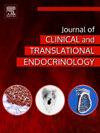胶原蛋白在垂体腺瘤中的生物学作用和临床意义的综合综述
IF 3.3
Q1 ENDOCRINOLOGY & METABOLISM
Journal of Clinical and Translational Endocrinology
Pub Date : 2025-07-10
DOI:10.1016/j.jcte.2025.100408
引用次数: 0
摘要
垂体腺瘤(PAs)是常见的脑肿瘤,约占所有脑肿瘤的15%。虽然通常是良性的,但它们可以通过质量效应和激素失调导致严重的并发症。越来越多的证据表明,胶原蛋白是细胞外基质(ECM)的主要成分,在PA病理生理中起着关键作用。胶原蛋白在肿瘤微环境(TME)中提供结构完整性和生化线索,影响细胞行为和细胞间相互作用。最近的研究表明,PAs中的胶原重塑是动态的,胶原成分和组织的改变影响肿瘤的生长、侵袭和激素分泌。胶原降解产物和胶原酶活性也可能促进肿瘤侵入邻近组织。此外,胶原蛋白与免疫调节有关,它作为一种物理屏障,限制免疫细胞浸润,并通过受体介导的信号传导促进免疫逃避。在代谢方面,胶原蛋白可以作为能量来源或调节代谢途径来维持肿瘤增殖。临床上,PAs中胶原蛋白含量与肿瘤一致性相关,这对手术切除策略有影响。此外,血清胶原蛋白正在成为PA诊断和预后的潜在非侵入性生物标志物。靶向胶原合成、降解或其机械转导信号通路是一种很有前途的治疗途径。本文章由计算机程序翻译,如有差异,请以英文原文为准。
Collagen in pituitary adenomas: A comprehensive review of biological roles and clinical implications
Pituitary adenomas (PAs) are common brain tumors, accounting for about 15% of all brain neoplasms. Although generally benign, they can lead to serious complications through mass effects and hormone dysregulation. Emerging evidence suggests that collagen, a major component of the extracellular matrix (ECM), plays a pivotal role in PA pathophysiology. Collagen provides both structural integrity and biochemical cues within the tumor microenvironment (TME), influencing cellular behaviors and intercellular interactions. Recent studies indicate that collagen remodeling in PAs is dynamic, with alterations in collagen composition and organization affecting tumor growth, invasion, and hormone secretion. Collagen degradation products and collagenase activity may also facilitate tumor invasion into adjacent tissues. Additionally, collagen has been implicated in immune modulation, acting as a physical barrier that restricts immune cell infiltration and promotes immune evasion through receptor-mediated signaling. Metabolically, collagen may serve as an energy source or modulate metabolic pathways to sustain tumor proliferation. Clinically, collagen content in PAs correlates with tumor consistency, which has implications for surgical resection strategies. Moreover, serum collagen is emerging as a potential non-invasive biomarker for PA diagnosis and prognosis. Targeting collagen synthesis, degradation, or its mechanotransductive signaling pathways represents a promising therapeutic avenue.
求助全文
通过发布文献求助,成功后即可免费获取论文全文。
去求助
来源期刊

Journal of Clinical and Translational Endocrinology
ENDOCRINOLOGY & METABOLISM-
CiteScore
6.10
自引率
0.00%
发文量
24
审稿时长
16 weeks
 求助内容:
求助内容: 应助结果提醒方式:
应助结果提醒方式:


